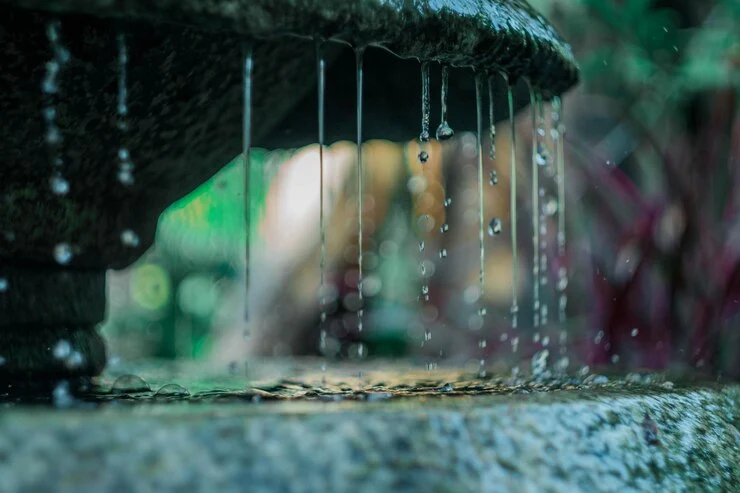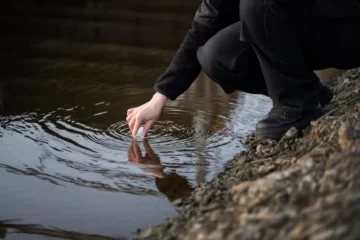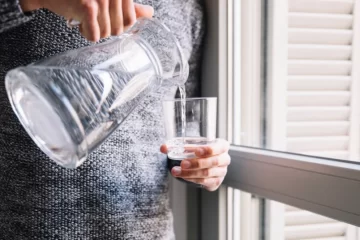Most people totally rely on well water for their drinking purpose. Sometimes the quality of well water may be affected by rain water, because rain water may contain many harmful acids due to pollution. If your well water is brown or cloudy, then you have to do some action to protect yourself from the harm of low quality well water.
In this article, we’ll diagnose the effect of heavy rain in your well, and also discuss the proper solution of this problem.
Does Rainwater Affect Well Water?
Yes, heavy rain may affect the quality of your well water because rain water may contain acids that also absorb some harmful bacteria and microorganisms. If you’re well system is not properly maintained, then rain water enters your well system.
If rain water enters your well system, then you may see color change in your well water like brown or cloudy color. If you notice color change then you have to test your well water and select a proper filtration system to protect your family.
How Rainwater Gets Into Your Well Water?
Well water gets into your well water by the process named infiltration. In this process, when rainwater falls in the land then some water evaporates due to heat, and some water leaks in soil, and moves downward. When rain water reaches near your well system, then the well system also absorbs rain water.
If your well system is too old, then small cracks are available to the top and bottom of your well. Rain water passes through these cracks easily, and makes your water polluted.
What Contaminants Can Be Found In Rainy Well water?
1. Acid
Rain water may absorb sulfur dioxide and nitrogen oxides from the atmosphere, and they react with water, and oxygen, from Sulfuric and nitric acid, which is very harmful for living things. The pH of acid rain is about 4.5 or more lower.
2. Bacteria
Rainwater picks up harmful bacteria like E.coli from the soil. These bacteria are found in animal waste. These bacteria are very harmful for animals.
3. Viruses
Some harmful viruses like Rotavirus, may be present in soil that’s found in dead organisms in soil.
4. Chemicals
Some chemicals such as pesticides, herbicides, motor oil, and other cleaning products mixed with rain water from road and agricultural land.
5. Salts
Rainwater quickly dissolves salts like sodium, potassium, magnesium, and sulfate from soil. These salts make your well water harder.
Safety Instruction Of Your Well Water During Heavy Rain
If harmful contaminants are present in your well water due to heavy rain, it may be very harmful for your health. That’s why you need some safety instructions to prevent harm from rain water:
1. Proper Well System
You should choose the correct location of your well system. You should set up your well about 50 feet deep from potential sources like storage areas, or septic tanks.
2. Seal Well Ceasing
You should seal your well water cap to prevent seeping out rainwater in your well. You can seal the gap from ceasing of your well by using cement.
3. Maintain Vegetable Buffers
You should plant Vegetables and other types of grass near your well to prevent erosion. These plants act as natural filters and prevent erosion.
4. Water Quality Testing
You have to test your well water regularly, to see the change in your well water. If your well water changes then you have to select a proper filtration system to prevent health problems.
5. Awareness
You should educate your family members on the importance of protection of well water.
What Should I Do When Heavy Rain Affects Your Well Water?
If you think about the change in color, and taste in your well water after heavy rain. It indicates that your well water system is faulty. You should check which part of your well is at fault and make sure that It’s very difficult to repair your well properly.
Only one solution of this problem is to change your well water system to prevent the harm of rainy well water.
Conclusion
Most people depend on well water for their primary use. A common problem causes well water change after heavy rain. If you are facing this problem then it indicates that your well water system is faulty.
You should test your well water regularly and select a proper filtration system. If you’re facing this problem then you have to change your well to prevent further harm from rainwater.
FAQs
How does heavy rain impact the quality of well water?
Heavy rain can potentially increase the risk of contamination in well water due to surface runoff that carry pollutants into the groundwater.
What are the potential consequences of heavy rain on well water?
Heavy rain may lead to increased turbidity and the presence of harmful bacteria or chemicals in well water, posing health risks to consumers.
Is there a correlation between heavy rain and bacterial contamination in well water?
Yes, heavy rainfall can elevate the risk of bacterial contamination in well water due to increased surface runoff carrying bacteria into the groundwater.
What measures can homeowners take to safeguard their well water during heavy rainfall?
Homeowners can ensure proper sealing and maintenance of well casings to prevent surface water infiltration and regularly test their water for contaminants after heavy rainfall.
Does heavy rain increase the likelihood of sediment buildup in well water?
Yes, heavy rain can result in sediment runoff into wells, leading to increased turbidity and the need for filtration or treatment.






* * * Claim Free iPhone 16: http://bikanerartist.com/?vlw7ap * * * hs=0ff19a20d0cb3599402c2fbe4794a280*says:
sokxwu